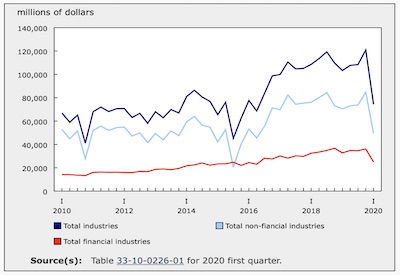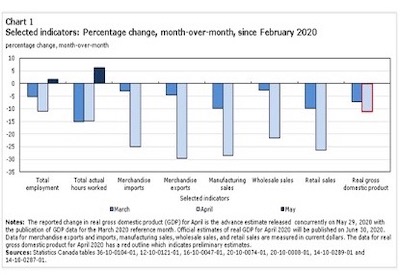Half of Businesses That Closed in March and April Re-opened by July 2020

Oct 29, 2020
The July estimates of business openings and closures show that, with the continued easing of COVID-19 restrictions, there was a large decrease in business closures. In July 2020, 36,513 business closures were observed in the Canadian business sector, 33.9% less than what was observed in June. This number of business closures in July is comparable with levels observed prior to the pandemic and 6.7% lower than the pre-COVID level observed in February 2020. By comparison, there was a slight decrease in the number of business openings of 3.3% from June to July. However, openings in July surpassed closures in the same month.
The July estimates for the experimental series on monthly openings and closings are now available. The series include monthly estimates of the number of business openings and closures, continuing businesses, and active businesses from January 2015 to July 2020.
With the exception of Yukon, which recorded a slight increase in business closures of 2.8% since June, the decrease in business closures was widespread across provinces and territories. The largest decreases in percentage terms since the previous month occurred in Quebec (-49.9%; -5,932), Ontario (-27.6%; -5,748), and Manitoba (-18.5%; -243). In all provinces and territories, the number of business closures is lower than or very close to the pre-COVID level of February 2020.
The number of business closures decreased in the top three census metropolitan areas. From June to July, business closures decreased by 4,159 (-56.4%) in Montréal, by 4,572 (-35.9%) in Toronto and by 855 (-18.7%) in Vancouver.
At the industry level, there were fewer business closures in July than in June in all industries. Declines of more than 50% were observed in arts, entertainment and recreation (-57.4%; -905), in other services (-56.3%; -2,646), which include personal services, and in accommodation and food services (-56.0%; -3,058). In all industries except manufacturing, the number of business closures is lower than the pre-pandemic level. For instance, in accommodation and food services, which was among the most impacted by the pandemic in terms of business closures, there were 3.9% fewer closures in July compared with February.
Business openings decreased slightly in July. There were 52,258 business openings in July, a decrease of 3.3% compared with June.
Half of businesses that closed in March and April re-opened by July 2020
With the exception of some regions in Ontario, all provinces and territories greatly eased public health restrictions by the end of July, and many businesses were able to re-open with extra safety precautions. The analysis of active businesses in February 2020 shows that, since June, 7.9% additional businesses re-opened, for a cumulative total of 49.5% businesses that re-opened by July 2020.
All industries recorded fewer business re-openings in July than in June, but in many industries, more than half of businesses that closed in March and April have re-opened. In other services (except public administration), accommodation and food services, and transportation and warehousing, the industries with the highest share of business closures, 60.0%, 57.7% and 44.1% of businesses re-opened by July, respectively.
Among businesses that were active in February 2020, the largest share of business closures in March and April was observed in Ontario (18.7%), British Columbia (18.2%) and Prince Edward Island (17.3%). In comparison, lower shares were observed in Manitoba (12.8%) and in the territories, where lower shares of active businesses closed in the Northwest Territories (13.6%), Yukon (11.7%) and Nunavut (3.9%).
By June, at least one in three businesses had re-opened across the provinces; by July, this proportion increased to at least four in ten. In most provinces, at least half of businesses that had closed in March and April had re-opened by July. For instance, nearly 60% of businesses re-opened in New Brunswick (59.1%), Quebec (58.8%) and Prince Edward Island (57.2%).
The lowest proportion of re-openings occurred in Ontario (43.3%), which may be related to restrictions on businesses still in place in July in some parts of the provinces.
Source: Statistics Canada, www150.statcan.gc.ca/n1/daily-quotidien/201028/dq201028c-eng.htm?CMP=mstatcan











